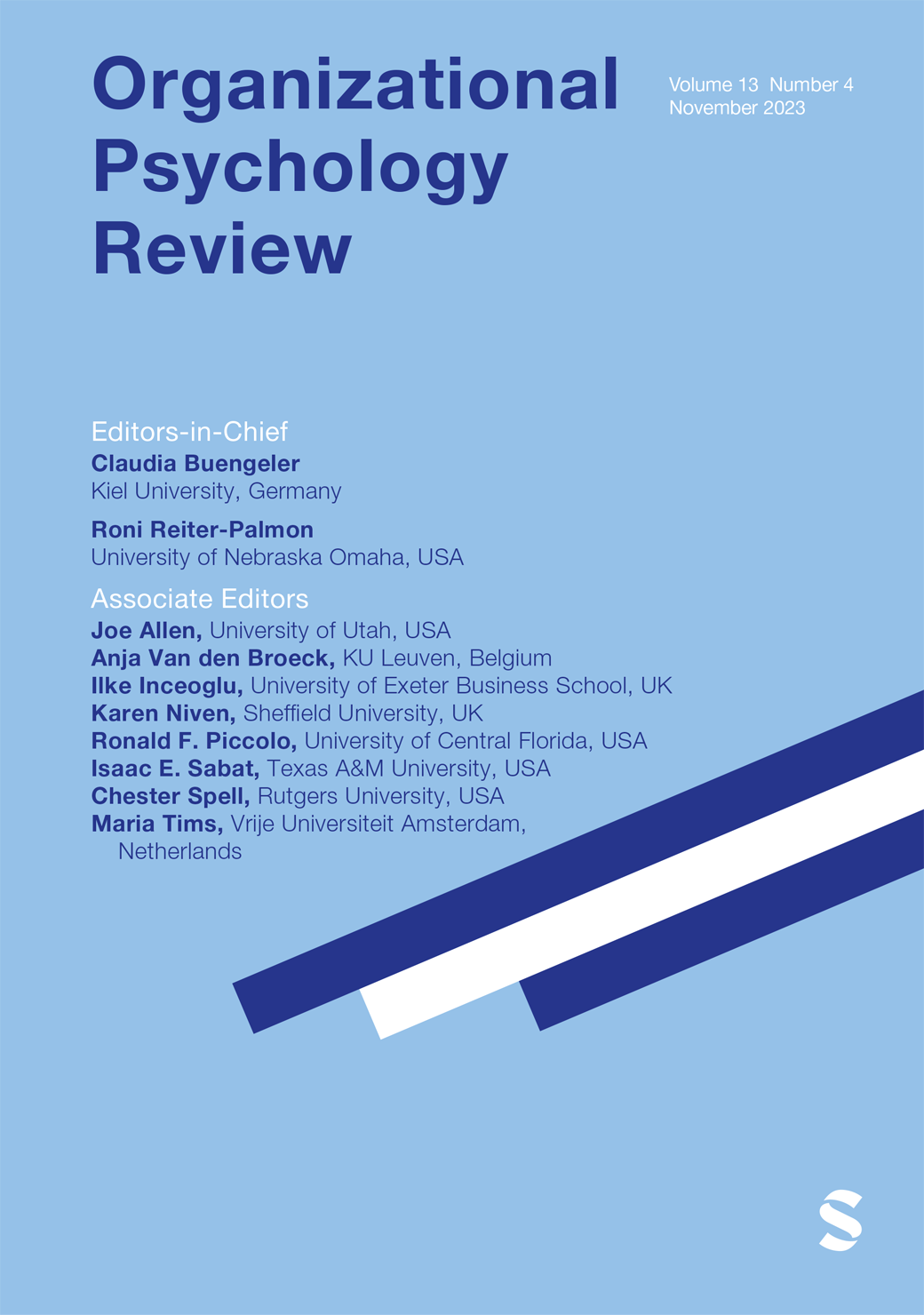最后,一些“自我时间”:通勤好处的新理论视角
IF 7.1
1区 心理学
Q2 MANAGEMENT
引用次数: 6
摘要
大多数关于通勤的研究都集中在它的消极方面和后果(即压力)上。然而,一些研究也开始认识到通勤可能有积极的一面。在本文中,我们开发了一个迄今为止受到有限关注的观点,强调了通勤如何作为期望和有益的“我的时间”来体验,因为它居住在与工作或家庭角色要求不太相关的“第三空间”。借鉴并整合了通勤、休闲、恢复和身份的理论和研究,我们首先定义了这一结构,然后建立了一个理论模型,旨在解决有关预测参与“自我时间”的动机、“自我时间”的有益结果以及这些影响的潜在调节因素的关键问题。因此,我们提出的模型为通勤员工及其雇主、家庭和社会提供了研究和实践意义。大多数关于通勤的研究都集中在它的消极方面和后果(即压力)上。然而,越来越多的工作也开始认识到通勤可能有一些积极的方面。尽管一些学者承认通勤的潜在好处,但大多数人仍然将通勤概念化为领域(即工作和家庭)之间的必要过渡。在本文中,我们试图为文献带来一个新的视角,强调如何将通勤体验为理想的“自我时间”。因此,我们开发了一个理论模型,旨在解决围绕这一现象的关键问题,包括通勤期间的“我的时间”是什么,谁更有可能利用通勤来获得“我的时间”,促进或抑制选择“我的时间”的情境因素是什么,参与“我的时间”时可以预期哪些积极的结果,以及什么条件可能影响这一过程。我们还讨论了这一过程的潜在机制。因此,我们提出的模型对通勤员工及其雇主、家庭和社会都具有研究和实际意义。本文章由计算机程序翻译,如有差异,请以英文原文为准。
Finally, some “me time”: A new theoretical perspective on the benefits of commuting
Most research on commuting has focused on its negative aspects and consequences (i.e., stress). However, some work has also begun to recognize that there may be positive aspects to commuting. In this paper, we develop a perspective that has so far received limited attention, highlighting how the commute can be experienced as desired and beneficial “me time”, due to the fact that it inhabits a “third space” that is less associated with work or home role requirements. Drawing upon and integrating theories and research on commuting, leisure, recovery, and identity, we first define this construct and then develop a theoretical model that aims to address key questions regarding predicting motivation to engage in “me time”, beneficial outcomes of “me time”, and potential moderators of these effects. Consequently, our proposed model offers both research and practical implications for commuting employees as well as their employers, families, and society. Plain Language Summary The majority of research on commuting has focused on its negative aspects and consequences (i.e., stress). However, increasingly, some work has also begun to recognize that there may be some positive aspects of commuting. Despite some scholars acknowledging the potential benefits of commuting, most still conceptualize the commute as simply a necessary transition between domains (i.e., work and home). In this paper, we seek to bring a new perspective to the literature, highlighting how the commute can be experienced as desired “time to myself”. We therefore develop a theoretical model that aims to address key questions surrounding this phenomenon, including what is “me time” during the commute, who is more likely to uses the commute for “me time”, what are the situational factors that facilitate or inhibit choosing “me time”, what positive outcomes can be expected when engaging in “me time”, and what conditions are likely to affect this process. We also discuss the underlying mechanisms for this process. As a result, our proposed model presents both research and practical implications for commuting employees as well as their employers, families, and society.
求助全文
通过发布文献求助,成功后即可免费获取论文全文。
去求助
来源期刊

Organizational Psychology Review
Multiple-
CiteScore
10.00
自引率
1.60%
发文量
25
期刊介绍:
Organizational Psychology Review is a quarterly, peer-reviewed scholarly journal published by SAGE in partnership with the European Association of Work and Organizational Psychology. Organizational Psychology Review’s unique aim is to publish original conceptual work and meta-analyses in the field of organizational psychology (broadly defined to include applied psychology, industrial psychology, occupational psychology, organizational behavior, personnel psychology, and work psychology).Articles accepted for publication in Organizational Psychology Review will have the potential to have a major impact on research and practice in organizational psychology. They will offer analyses worth citing, worth following up on in primary research, and worth considering as a basis for applied managerial practice. As such, these should be contributions that move beyond straight forward reviews of the existing literature by developing new theory and insights. At the same time, however, they should be well-grounded in the state of the art and the empirical knowledge base, providing a good mix of a firm empirical and theoretical basis and exciting new ideas.
 求助内容:
求助内容: 应助结果提醒方式:
应助结果提醒方式:


